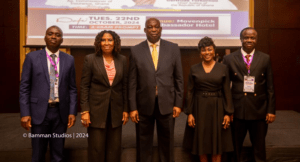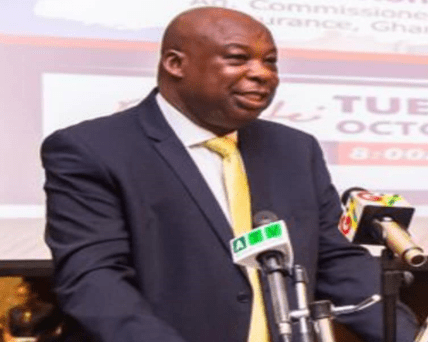By Elliot WILLIAMS
A one-day workshop has been held for selected superior court (high court) judges to update them on the legal framework for insurance contracts in Ghana. The workshop held at the plush Movenpick Hotel in Accra under the auspices of the insurance industry regulator, the National Insurance Commission.

The workshop was organized to enable the judges in attendance to meet the needs of the sizeable proportion of the populace, as well as the licensed insurers themselves, to rule on litigation presented to law courts to interpret their respective insurance contracts and where required, determine the extent of the liability.
Apart from the judges selected to benefit from the workshop, the Chairperson of the NIC, Ms Abena Kesewa Brown, the Acting Commissioner of Insurance, Michael Kofi Andoh, the President of the Ghana Insurance Association, Seth Aklasi, also attended the event chieftains of insurance companies, and Lords and Ladyships of the superior courts of the Judiciary.
Justice I.O. Tanko Amadu, a justice of the Supreme Court and Director of the Judicial Training Institute, JTI, ably represented the Chief Justice.
In his opening address, Justice Tanko Amadu commended the NIC for its initiative that recognises the need for collaboration between the key stakeholders in the insurance industry and judges who serve as the final arbiters in insurance disputes, even where in some cases, the dispute has gone through the process of Alternative Dispute Resolution.
“The law of insurance is specially designed as it is a special contract,” he explained in his opening address. “As judges, we require conscious and special expertise of the subject to facilitate sound and profound decisions in determining the rights of the contracting parties.”
He noted that the risks covered by insurance, often unforeseen, “usually require conscious efforts to put in place the necessary mechanisms in managing or mitigating them. Insurance products lead in the definition of these protective mechanisms against unforeseen disasters, accidents and losses.”
He continues that “if parties to an insurance contract are confident of not only a just outcome from insurance disputes from the courts, but a satisfaction that the arbiter demonstrated sufficient and appreciable knowledge on the subject of insurance, the seeming negative mind-set against signing unto insurance products in the event of an unsatisfactory legal outcome will be lessened.
”This is of vital importance as insurance penetration in Ghana is extremely low at barely 2%. Indeed, NIC’s data reveals that barely 25% of Ghana’s population are insured.
“The specialized nature of insurance presents a professional challenge to even judges that have been closely involved in litigation between insurers and their clients.
Asserts Justice Tanko Amadu “We cannot pretend to be repository of all knowledge especially in areas that require technical expertise and special knowledge. This concession makes this seminar even more important to the participants.”
However, the situation is made even more complex by recent key developments in the regulatory framework of the industry in Ghana. The Insurance Act 2021 (Act 1061) is the principal legislation that regulates the industry, having replaced the erstwhile Insurance Act 2006 (Act 724).
Among the changes the most recent insurance law rang in are the making of the NIC an independent body with the power to sue and be sued and to acquire assets of its own.
The new further enjoins the NIC to embrace some guiding principles, which include the need for it to embrace best practices regarding International Insurance Standards and sound management principles.
In addition, the current legislation introduces the “fit and proper” person requirement – in line with a similar requirement introduced by the Bank of Ghana for the commercial banking industry – that requires only persons of certain qualities to apply for insurance licenses and manage insurance companies.
Unlike in most western jurisdictions where huge insurance industries have enabled the courts to develop a wealth of jurisprudence on the myriad of issues related to the industry, insurance jurisprudence in Ghana is only now developing.
Notwithstanding the paucity of case law, the Superior Courts of Ghana have had the opportunity to clarify, enforce and direct on the proper approach to insurance transactions.
The Supreme Court itself defines the nature of an insurance contract as “A contract whereby one person called the insurer, undertakes, in return for the agreed consideration, called the premium, to pay to another person, called the assured, a sum of money or its equivalent, on the happening of a specified event.”
Another key court ruling in Ghana explains the duty of the parties in an insurance contract to act in good faith by making full disclosures to the counterparty saying, “In contracts of insurance, utmost good faith is required of the proposer to disclose material facts to the insurer.”
Equally important is a ruling that every insurance contract must state the limit of the liability involved saying, “the only safe way is to uphold the law that the limit of every insurance business should be predetermined and known in order to make the business valid.” This ensures that an insurance company is in a position to pay whatever claims may arise.










